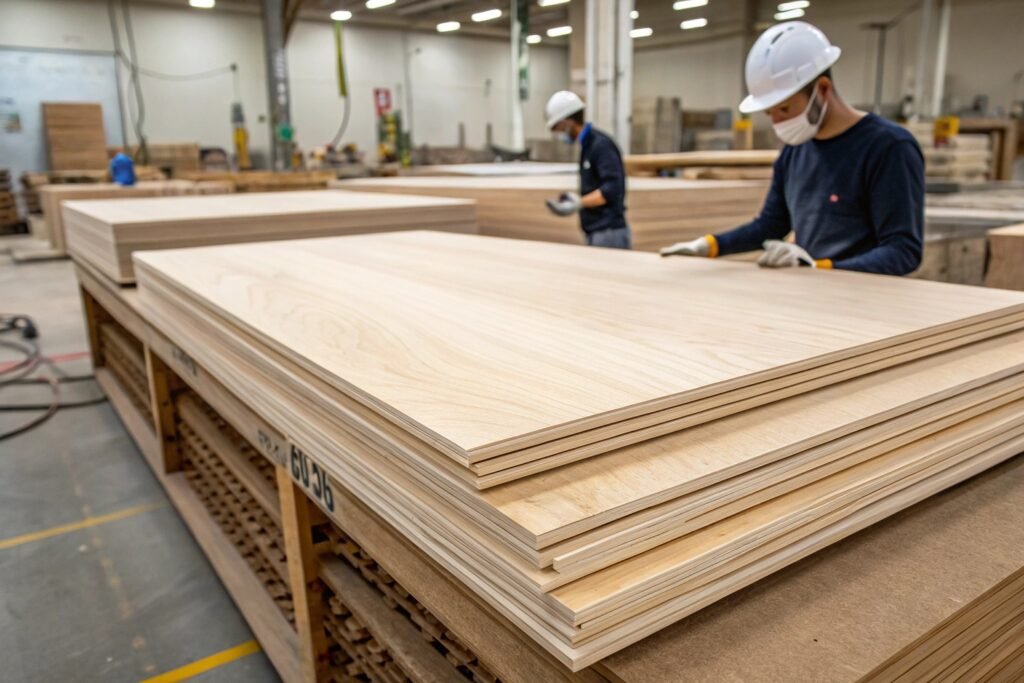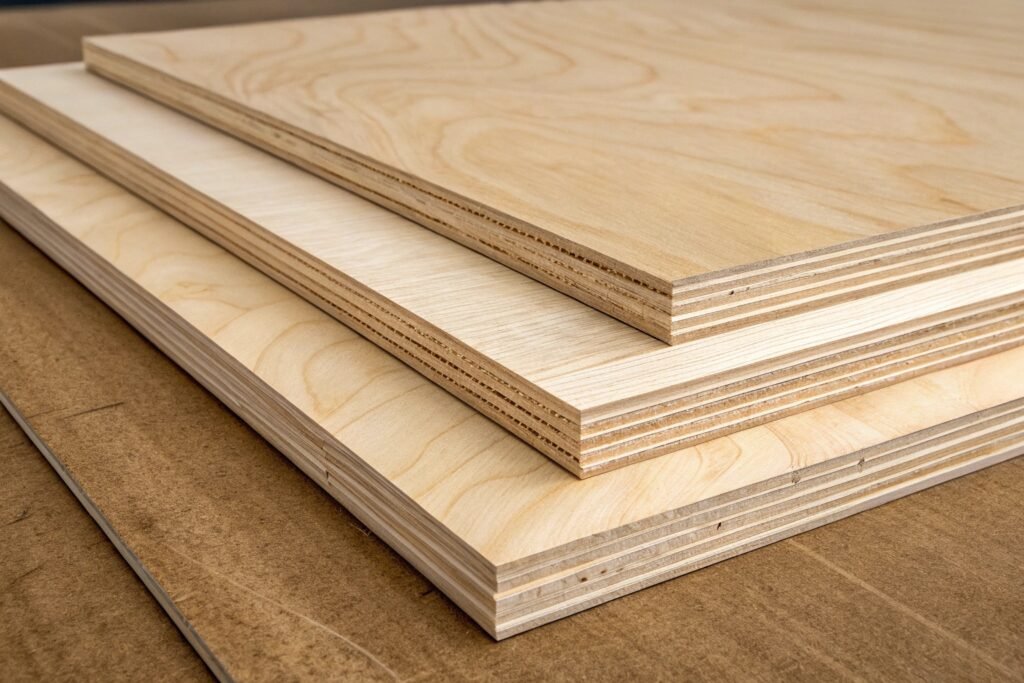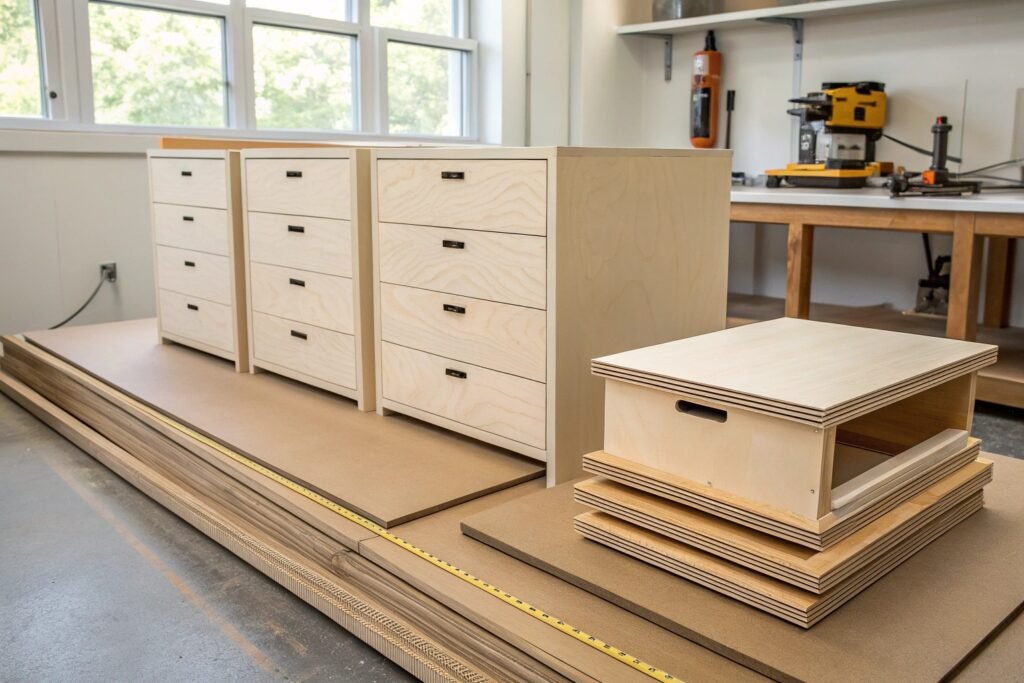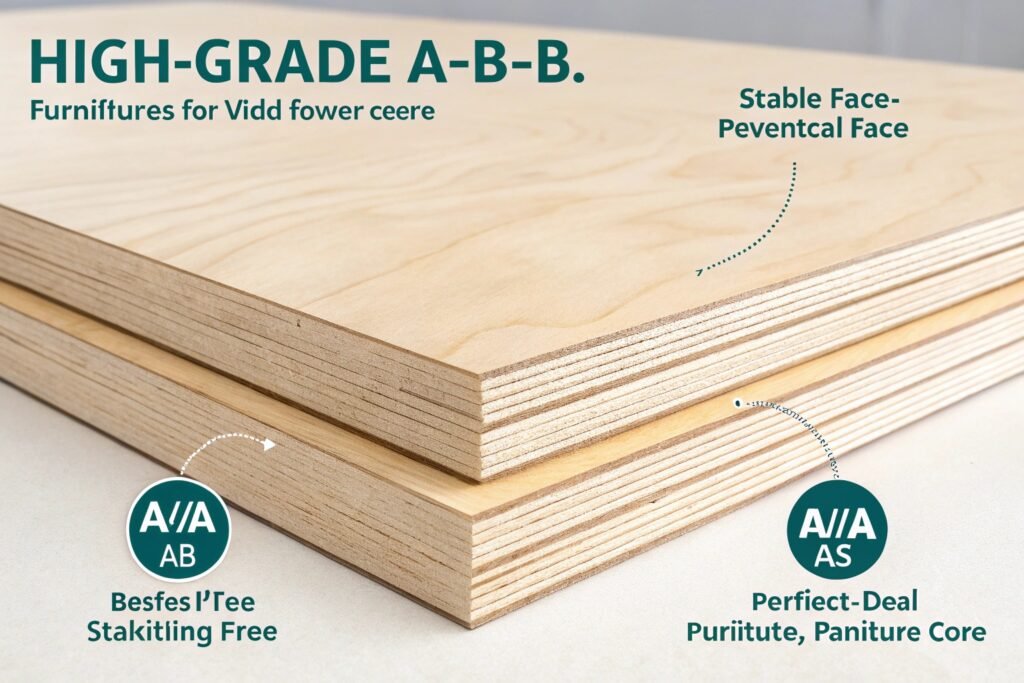Pick the wrong plywood, and your cabinets might sag, swell, or chip in a few months. The right choice makes all the difference in durability and appearance.
Use high-grade hardwood plywood like birch or maple for cabinets and furniture; look for smooth veneers, balanced cores, and moisture resistance.

I’ve helped many clients redesign cabinets that failed early—not because of bad design, but because of poor plywood choices. Knowing what to look for helps avoid that.
What type of plywood is best for cabinets?
Cabinets need clean finishes, solid screw holding, and resistance to moisture. Not all plywood offers this.
The best plywood for cabinets is A-grade hardwood plywood, such as birch, maple, or poplar, with balanced layers and minimal core gaps.

Comparing Types for Cabinet Use
Let’s look at how various plywood types perform in cabinet building:
| Plywood Type | Core Construction | Best Use | Notes |
|---|---|---|---|
| Baltic Birch | All-veneer core | High-end cabinetry, drawer boxes | Strong, very stable |
| Veneer Core Hardwood | Veneer core + face veneer | Painted or stained cabinets | Common, cost-effective |
| MDF Core Plywood | MDF core, veneer face | Painted surfaces | Smooth, but heavy |
| Particle Core | Particle center layer | Budget cabinetry | Low strength, not for wet areas |
I once used MDF-core plywood for a painted vanity—it worked beautifully. But I avoid it in kitchens where moisture can cause swelling.
What thickness ply to use for cabinets?
Going too thin means sagging shelves. Too thick adds cost and weight. The right thickness keeps structure without waste.
Use 3/4" (19mm) plywood for cabinet boxes and shelves; 1/4" (6mm) or 1/2" (12mm) is fine for back panels or drawer bottoms.

Common Thickness Choices
Here’s a quick breakdown of what to use where:
| Cabinet Part | Recommended Thickness | Reason |
|---|---|---|
| Side Panels | 3/4" (19mm) | Structural support |
| Top/Bottom Panels | 3/4" (19mm) | Stability and load-bearing |
| Shelves | 3/4" (19mm) | Resists sagging |
| Back Panels | 1/4" or 1/2" (6–12mm) | Light load, mostly for squaring |
| Drawer Bottoms | 1/4" (6mm) | Lightweight items only |
In our factory, we always default to 3/4" for structural parts. Only in cost-sensitive cases do we consider thinner options.
What grade of plywood is ideal for furniture?
Furniture needs to look clean and last long. Surface quality is just as important as core strength.

The ideal grade for furniture is A/B or A/A, with a flawless face veneer for staining or painting and a stable, void-free core.
Decoding Plywood Grades
Here’s how furniture-grade plywood is rated:
| Grade | Face | Back | Description |
|---|---|---|---|
| A/A | A | A | Perfect on both sides, best for exposed work |
| A/B | A | B | One clean side, suitable for one-side visibility |
| B/C | B | C | Small defects on one side |
| C/C | C | C | Construction use only |
One of my clients once chose C-grade plywood to save money on a bench project. The veneer chipped and bubbled after finishing. We replaced it with A/B—and the difference was night and day.
What is the best plywood to make furniture?
Furniture sees daily wear, and it often gets painted or stained. So both strength and finish matter.
The best plywood for making furniture is high-grade hardwood plywood like birch, maple, or walnut, with smooth faces and a stable core.
Cost, Appearance, and Durability Balance
Let’s compare top furniture plywood options:
| Wood Species | Look | Durability | Cost Level | Best For |
|---|---|---|---|---|
| Baltic Birch | Light, smooth grain | Very high | High | Drawers, modern furniture |
| Maple Plywood | Clean, light tone | High | Medium | Kitchen cabinets, painted items |
| Walnut Plywood | Rich, dark tones | High | Very high | High-end furniture, panels |
| Poplar Core | Stable, accepts paint well | Medium | Lower | Painted furniture, interiors |
For one luxury client, we used walnut plywood with A/A grade. It elevated the furniture instantly—deep tones, sharp contrast, and minimal finishing effort.
Conclusion
Choose A-grade hardwood plywood with stable cores and right thickness—good materials make better cabinets and longer-lasting furniture.
